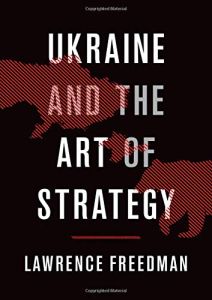Join getAbstract to access the summary!

Join getAbstract to access the summary!
Lawrence Freedman
Ukraine and the Art of Strategy
Oxford UP, 2019
What's inside?
You thought Vladimir Putin was playing chess. In truth, he’s playing geopolitical judo – long-term consequences be damned.
Recommendation
For a time, Vladimir Putin seemed to have outmaneuvered the rest of the world. When he snatched a chunk of Ukraine and the great powers did nothing, Putin appeared strong, while the hand-wringing West appeared inept. Half a decade later, however, Putin’s strategic acumen looks less acute that it once did, Lawrence Freedman argues in this concise post-mortem. The experts thought Putin was playing chess. In truth, Freedman asserts, Putin was playing a game closer to his heart: judo – a sport where the sudden takedown is far more important than the long-term consequences of any action.
Summary
About the Author
Sir Lawrence Freedman is emeritus professor of war studies at King’s College London. His previous books include Strategy: A History and The Future of War: A History.


















Comment on this summary